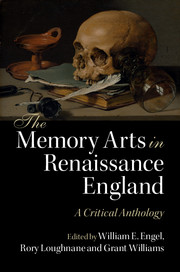Book contents
- Frontmatter
- Dedication
- Contents
- List of figures
- Acknowledgements
- A note on abbreviations
- Introduction
- PART I The art of memory
- PART II Rhetoric and poetics
- PART III Education and science
- Introduction to Part III
- III.1 Thomas Elyot, The Governor (1531)
- III.2 Roger Ascham, The Schoolmaster (1570)
- III.3 Levinus Lemnius, The Touchstone of Complexions (1576)
- III.4 William Kempe, The Education of Children (1588)
- III.5 John Brinsley, Ludus literarius (1612)
- III.6 Robert Burton, The Anatomy of Melancholy (1621)
- III.7 Thomas Sprat, The History of the Royal Society (1667)
- III.8 John Wilkins, An Essay towards a Real Character (1668)
- III.9 Obadiah Walker, Of Education (1673)
- III.10 Robert Hooke, ‘An Hypothetical Explication of Memory’ (1682)
- PART IV History and philosophy
- PART V Religion and devotion
- PART VI Literature
- Index
- References
III.10 - Robert Hooke, ‘An Hypothetical Explication of Memory’ (1682)
from PART III - Education and science
Published online by Cambridge University Press: 05 August 2016
- Frontmatter
- Dedication
- Contents
- List of figures
- Acknowledgements
- A note on abbreviations
- Introduction
- PART I The art of memory
- PART II Rhetoric and poetics
- PART III Education and science
- Introduction to Part III
- III.1 Thomas Elyot, The Governor (1531)
- III.2 Roger Ascham, The Schoolmaster (1570)
- III.3 Levinus Lemnius, The Touchstone of Complexions (1576)
- III.4 William Kempe, The Education of Children (1588)
- III.5 John Brinsley, Ludus literarius (1612)
- III.6 Robert Burton, The Anatomy of Melancholy (1621)
- III.7 Thomas Sprat, The History of the Royal Society (1667)
- III.8 John Wilkins, An Essay towards a Real Character (1668)
- III.9 Obadiah Walker, Of Education (1673)
- III.10 Robert Hooke, ‘An Hypothetical Explication of Memory’ (1682)
- PART IV History and philosophy
- PART V Religion and devotion
- PART VI Literature
- Index
- References
Summary
About the author
Robert Hooke (1635–1703), curator of experiments for the Royal Society, was a natural philosopher, engineer and physicist, whose scientific, architectural and mechanical inventions and discoveries are too numerous to recount. He launched, for example, the discipline of optical microscopy with Micrographia (1665), a treatise on designing and using microscopes.
About the text
Before the Royal Society on 21 June 1682, Hooke presented a lecture entitled ‘An Hypothetical Explication of Memory: how the Organs made use of by the Mind in its Operation may be Mechanically understood’. This lecture is an anomaly in Hooke's scholarship. Despite conducting research into perception and vision, he never examined psychological matters prior to or after this lecture.
The arts of memory
Hooke's lecture reaches the outer limits of the memory arts, pushing them into the realm of early modern science. In effect, he situates Aristotelian recollection and the Ciceronian storehouse within the context of mechanistic philosophy. Notwithstanding his deference to the soul as a mental agent, he conceives of the faculty of memory as a material organ capable of measurement, going so far as to calculate the number of images or ideas that the typical brain records over a day and throughout a lifetime.
In the excerpt below, Aristotle's model of the chain of mental imagery furnishes Hooke with an explanation about how the brain estimates duration. Our brains do not ascertain the passage of time through the senses but through a string of images enfolded in the memory. Along the string, the distance between the most recent idea and the stored idea enables the mind to sense time elapsed.
Textual notes
Lectures of Light, section VII, in The Posthumous Works of Robert Hooke (London, 1705), pp. 140–1.
‘An Hypothetical Explication of Memory’
The repository I conceive to be seated in the brain, and the substance thereof I conceive to be the material out of which these ideas are formed, and where they are also preserved when formed, being disposed in some regular order; which order I conceive to be principally that according to which they are formed, that being first in order that is first formed, and that next which is next, and so continually by succession from the time of our birth to the time of our death.
- Type
- Chapter
- Information
- The Memory Arts in Renaissance EnglandA Critical Anthology, pp. 179 - 182Publisher: Cambridge University PressPrint publication year: 2016



